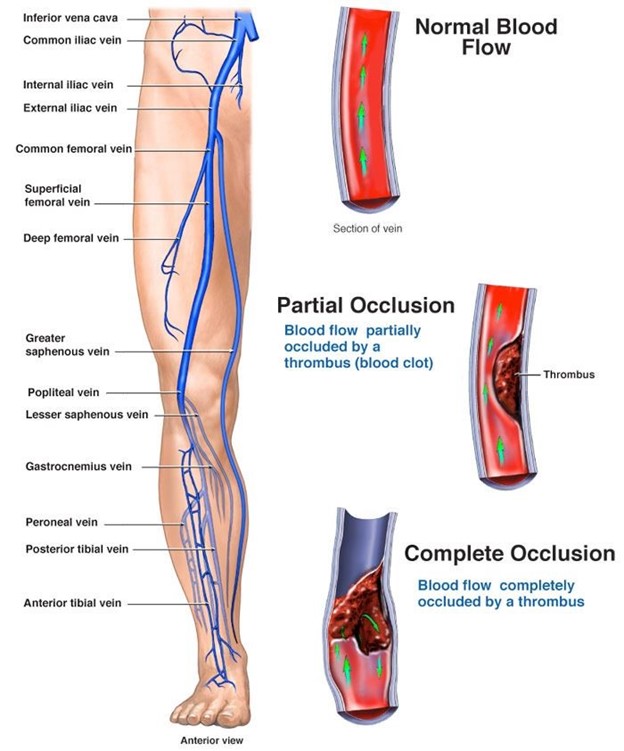A nurse is caring for a client who is 12 hr postpartum and has deep-vein thrombosis of the left leg. The client is receiving anticoagulant therapy. Which of the following actions should the nurse take?
Massage the affected extremity every 4 hr.
Initiate bed rest.
Apply an ice pack to the effected extremity for 20 min every 2 hr.
Administer aspirin for pain.
The Correct Answer is B
Deep-vein thrombosis (DVT) is a condition where a blood clot forms in a deep vein, usually in the legs. Bed rest is often recommended for clients with DVT to reduce the risk of the clot dislodging and causing a pulmonary embolism. By minimizing movement and keeping the leg elevated, the nurse can help prevent further complications.
The other options listed are incorrect:
- Massage the affected extremity every 4 hours: Massaging the affected extremity can dislodge the clot, increasing the risk of a pulmonary embolism. It is contraindicated and should not be performed in clients with DVT.
- Apply an ice pack to the affected extremity for 20 minutes every 2 hours: While applying cold compresses or ice packs may be useful in some situations to reduce swelling or pain, it is not recommended for clients with DVT. Heat application or cold application should be avoided because they can promote blood circulation and potentially dislodge the clot.
- Administer aspirin for pain: Aspirin is not typically used for pain management in DVT. Anticoagulant therapy is the primary treatment for DVT, and specific anticoagulant medications are prescribed to prevent further clot formation and reduce the risk of complications.

Nursing Test Bank
Naxlex Comprehensive Predictor Exams
Related Questions
Correct Answer is ["0.25"]
Explanation
To calculate the amount of haloperidol oral concentrate the nurse should administer, we can use the following equation:
Volume (mL) = Dose (mg) / Concentration (mg/mL)
In this case, the dose is 0.5 mg and the concentration of the haloperidol oral concentrate is 2 mg/mL.
Volume (mL) = 0.5 mg / 2 mg/mL
Volume (mL) = 0.25 mL
Correct Answer is C
Explanation
Assessing the client's suicidal intent and the presence of a specific plan for self-harm is crucial in determining the level of immediate risk and the need for intervention. This question directly addresses the client's current state and potential danger.
While all the questions are important in assessing the client's situation, determining the presence of a plan for self-harm takes precedence as it helps evaluate the level of imminent danger and the need for immediate intervention.
The other questions are also important but can be addressed after ensuring the client's safety and appropriate intervention based on the information gathered regarding the plan for self-harm. These questions can provide additional information to further assess the client's support system, history, and current stressors, which can contribute to understanding the context and potential risk factors for the client.
Remember, if the client expresses an immediate plan and intent for self-harm, it is essential to take appropriate steps to ensure their safety, such as involving the appropriate mental health professionals, implementing a safety plan, and providing constant supervision as needed.
Whether you are a student looking to ace your exams or a practicing nurse seeking to enhance your expertise , our nursing education contents will empower you with the confidence and competence to make a difference in the lives of patients and become a respected leader in the healthcare field.
Visit Naxlex, invest in your future and unlock endless possibilities with our unparalleled nursing education contents today
Report Wrong Answer on the Current Question
Do you disagree with the answer? If yes, what is your expected answer? Explain.
Kindly be descriptive with the issue you are facing.
